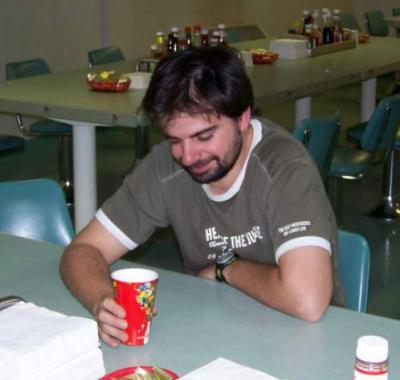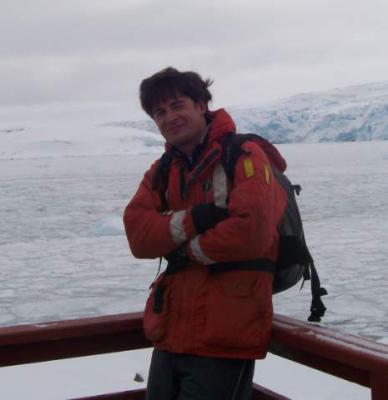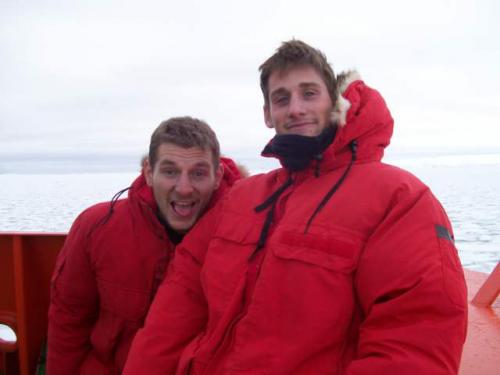Location: Ice Station Belgica Latitude: 70° 02′ S Longitude: **93° 43′ W **Air temperature: -7.7 °C (18.4 °F) Wind speed: 5 to 10 knots Barometric pressure: 967.2 mBar
Antarctic trivia (answer at the end of this journal entry): Fish that live in Antarctic waters need special adaptations to survive the harsh climate. What adaptation allows them to live in water that would otherwise freeze their blood and body tissues?
Our friendly neighborhood iceberg hasn’t hit the Palmer or smashed our floe to bits. There hasn’t been another fire or hurricane-strength blizzard. It’s something worse. Jeroen discovered late last week that we are now out of instant coffee!
First, let me tell you that coffee is a pretty important item around here. When you work outside all day coming in to a nice hot cup of coffee is something to look forward to. Staying up late warrants an extra cup the next morning. Working all day in the lab requires a fair bit of the stuff to stay alert – you wouldn’t want to make an error in there! Stian (official title Marine Projects Coordinator; responsible for managing the science support team, logistics of the science operations, and other duties too numerous to mention) told the science party early on that they were a "whole lot smarter” when they drank coffee… if that’s true, we’ve gotten pretty smart! Coffee matters around here…therein lies the problem.
The very hard-working kitchen staff (Nestor, Bill, Ale, and Lorenzo) work around the clock to keep us fed. There are so many opportunities to eat a meal around here that you could never go hungry. Snacks abound, too. The only problem is that the coffee, although hot and always available, isn’t very strong. People who’ve been on these cruises before came prepared. These guys are pros…an array of coffee making devices was set up and perking away once the cruise got underway in September. I’ve seen an espresso pot in Katie and Sharon’s lab, coffee pots in the MT workshop, IT office, and on the bridge, and Chris brought a funnel and his own secret recipe for some of the best coffee I’ve tasted anywhere. Chris is very generous with his funnel system; he always lets some really desperate looking person have what he calls "the second pour.”
The rest of us who did not come equipped with an alternative method for getting our caffeine fix rely on the big coffee machine in the galley. Various strategies have been tried for improving the standard-issue blend. I’ve taken to adding a packet of hot chocolate mix to my coffee – which makes a nice hot chocolate, but it doesn’t quite hit the spot like a good grande house blend (no milk, no sugar – I’m a coffee purist) from Starbucks would. Jeroen and others hit on a solution that seemed to have worked – they added instant coffee to the brewed coffee to make it stronger. All was well in coffee land until a few days ago when Jeroen made the sad discovery – we were out of instant coffee. Ever observant, Jeroen formulated a plan - he noticed the ship’s supply of ground coffee in a container under the coffee pot. He thought he would try making coffee Turkish style by adding fresh ground coffee to a brewed cup from the pot. I don’t know if Jeroen has tried this yet; I haven’t noticed him choking on coffee grounds, so perhaps the experiment was a success. Good strong coffee keeps coming up on lists of what people are looking forward to once we’re back in port and then at home. Bruno ponders the coffee crisis while taking a break from lab work.
 Bruno with his coffee.*
Bruno with his coffee.*
Meanwhile…we lost a bit of time the past few days to the weather. The winds continued to be quite strong from the north/northeast making it difficult to maintain the ship’s position at the edge of the floe. A few folks were "basketed” over to the ice edge to work, but most of us remained on the ship. The iceberg on our port side maintained its position relative to us the past few days. We do seem to be on schedule to depart the ice station on the 24th. We’re not yet leaving the ice; we’ll spend three days in transit to the ice edge doing ice observations, running CTDs and deploying buoys, etc. We’ll head toward Peter I Island and observe the animal populations there on our way. We plan to be secured for sea and heading towards Punta Arenas mid-afternoon on Friday the 26th.

*Part of our group from Belgium – Nix (above), Frederic and Gauthier (below).
 *
*
Answer to today’s Antarctic trivia question: Fish that live in Antarctic waters need special adaptations to survive the harsh climate. What adaptation allows them to live in water that would otherwise freeze their blood and body tissues?
Antarctic fish have special glycoproteins in their blood and body tissues that act like antifreeze to prevent them from freezing in water that is below the freezing point.
Marine mammals and seabirds spotted by Brent: Crabeater seal Leopard seal Minke whale Killer whale Snow petrel Giant petrel Antarctic petrel Slender-billed prion Southern fulmar Emperor penguin Adelie penguin

